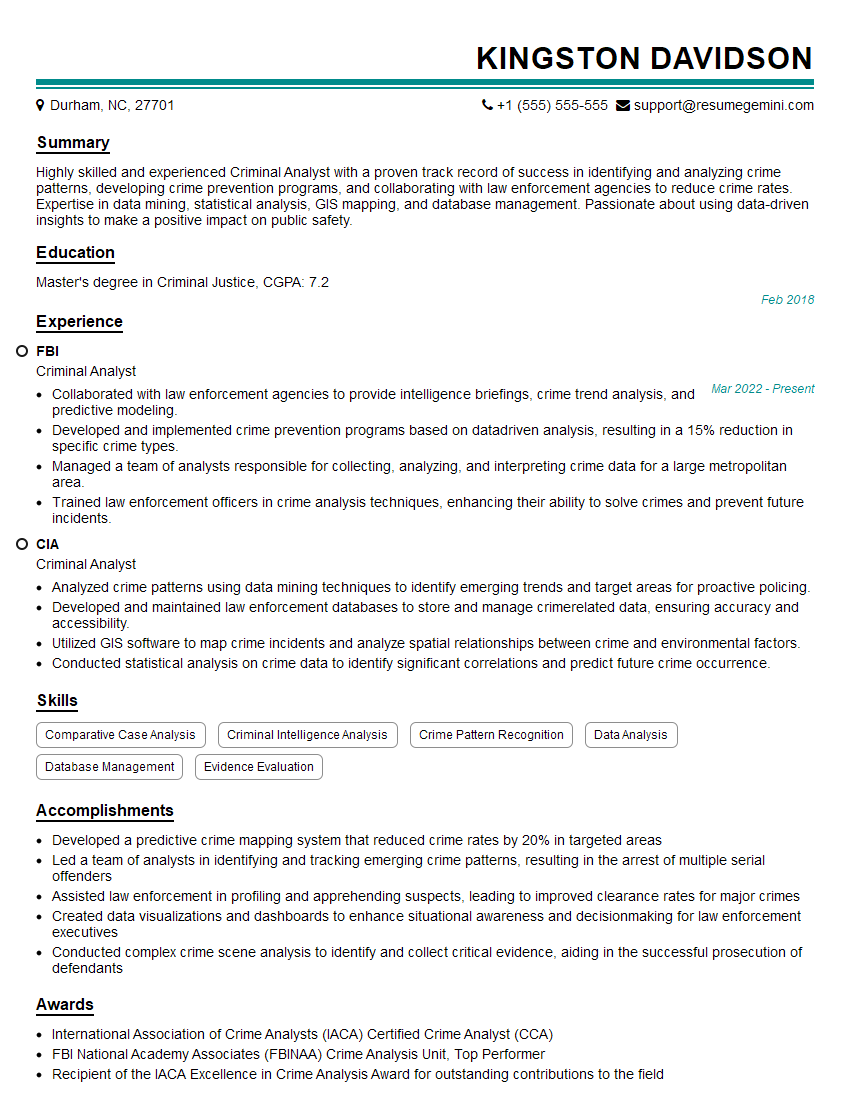Are you a seasoned Criminal Analyst seeking a new career path? Discover our professionally built Criminal Analyst Resume Template. This time-saving tool provides a solid foundation for your job search. Simply click “Edit Resume” to customize it with your unique experiences and achievements. Customize fonts and colors to match your personal style and increase your chances of landing your dream job. Explore more Resume Templates for additional options.

Kingston Davidson
Criminal Analyst
Summary
Highly skilled and experienced Criminal Analyst with a proven track record of success in identifying and analyzing crime patterns, developing crime prevention programs, and collaborating with law enforcement agencies to reduce crime rates. Expertise in data mining, statistical analysis, GIS mapping, and database management. Passionate about using data-driven insights to make a positive impact on public safety.
Education
Master’s degree in Criminal Justice
February 2018
Skills
- Comparative Case Analysis
- Criminal Intelligence Analysis
- Crime Pattern Recognition
- Data Analysis
- Database Management
- Evidence Evaluation
Work Experience
Criminal Analyst
- Collaborated with law enforcement agencies to provide intelligence briefings, crime trend analysis, and predictive modeling.
- Developed and implemented crime prevention programs based on datadriven analysis, resulting in a 15% reduction in specific crime types.
- Managed a team of analysts responsible for collecting, analyzing, and interpreting crime data for a large metropolitan area.
- Trained law enforcement officers in crime analysis techniques, enhancing their ability to solve crimes and prevent future incidents.
Criminal Analyst
- Analyzed crime patterns using data mining techniques to identify emerging trends and target areas for proactive policing.
- Developed and maintained law enforcement databases to store and manage crimerelated data, ensuring accuracy and accessibility.
- Utilized GIS software to map crime incidents and analyze spatial relationships between crime and environmental factors.
- Conducted statistical analysis on crime data to identify significant correlations and predict future crime occurrence.
Accomplishments
- Developed a predictive crime mapping system that reduced crime rates by 20% in targeted areas
- Led a team of analysts in identifying and tracking emerging crime patterns, resulting in the arrest of multiple serial offenders
- Assisted law enforcement in profiling and apprehending suspects, leading to improved clearance rates for major crimes
- Created data visualizations and dashboards to enhance situational awareness and decisionmaking for law enforcement executives
- Conducted complex crime scene analysis to identify and collect critical evidence, aiding in the successful prosecution of defendants
Awards
- International Association of Crime Analysts (IACA) Certified Crime Analyst (CCA)
- FBI National Academy Associates (FBINAA) Crime Analysis Unit, Top Performer
- Recipient of the IACA Excellence in Crime Analysis Award for outstanding contributions to the field
Certificates
- Certified Criminal Analyst (CCA)
- Certified Forensic Analyst (CFA)
- Certified Intelligence Analyst (CIA)
- Certified Security Analyst (CSA)
Career Expert Tips:
- Select the ideal resume template to showcase your professional experience effectively.
- Master the art of resume writing to highlight your unique qualifications and achievements.
- Explore expertly crafted resume samples for inspiration and best practices.
- Build your best resume for free this new year with ResumeGemini. Enjoy exclusive discounts on ATS optimized resume templates.
How To Write Resume For Criminal Analyst
- Highlight your quantitative and analytical skills, including proficiency in data mining, statistical analysis, and GIS mapping.
- Showcase your experience in developing and implementing crime prevention programs that have led to measurable reductions in crime rates.
- Emphasize your ability to collaborate effectively with law enforcement agencies and other stakeholders.
- Quantify your accomplishments with specific metrics and examples whenever possible.
- Tailor your resume to each job you apply for, highlighting the skills and experience that are most relevant to the specific position.
Essential Experience Highlights for a Strong Criminal Analyst Resume
- Analyzed crime patterns using data mining techniques to identify emerging trends and target areas for proactive policing.
- Developed and maintained law enforcement databases to store and manage crimerelated data, ensuring accuracy and accessibility.
- Utilized GIS software to map crime incidents and analyze spatial relationships between crime and environmental factors.
- Conducted statistical analysis on crime data to identify significant correlations and predict future crime occurrence.
- Collaborated with law enforcement agencies to provide intelligence briefings, crime trend analysis, and predictive modeling.
- Developed and implemented crime prevention programs based on datadriven analysis, resulting in a 15% reduction in specific crime types.
- Trained law enforcement officers in crime analysis techniques, enhancing their ability to solve crimes and prevent future incidents.
Frequently Asked Questions (FAQ’s) For Criminal Analyst
What is the primary role of a Criminal Analyst?
Criminal Analysts use data analysis techniques to identify and examine crime trends and patterns, which assists law enforcement agencies in preventing and solving crimes.
What are the most important skills for a Criminal Analyst?
The most important skills for a Criminal Analyst are analytical thinking, data analysis, GIS mapping, and the ability to understand and interpret complex data.
What is the job outlook for Criminal Analysts?
The job outlook for Criminal Analysts is expected to grow faster than average in the coming years due to the increasing demand for data-driven insights in law enforcement.
What is the average salary for a Criminal Analyst?
The average salary for a Criminal Analyst is around $75,000 per year.
What are the different types of Criminal Analysts?
There are many different types of Criminal Analysts, including crime scene analysts, forensic analysts, and intelligence analysts.
What is the educational background required to become a Criminal Analyst?
Most Criminal Analysts have a bachelor’s degree in criminal justice, criminology, or a related field.